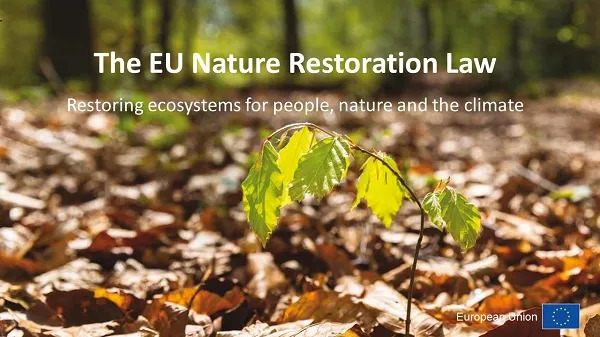European Parliament adopts nature restoration law

- 29 Feb 2024
Why is it in the News?
The European Parliament recently adopted the first European Union (EU) law to restore degraded ecosystems across the 27-nation political and economic bloc.
About the Nature Restoration Law:
- The Nature Restoration Law is hailed as a significant stride toward rejuvenating Europe’s natural habitats, with a staggering 81% currently classified as being in poor health.
- It sets a pioneering example for global emulation, emphasizing the criticality of safeguarding and revitalizing our natural environment for the welfare of forthcoming generations.
Objectives:
- This legislation aims to rejuvenate ecosystems, habitats, and species across the European Union's (EU) terrestrial and marine domains, fostering the enduring recuperation of diverse and robust nature.
- Additionally, it endeavors to contribute to the EU's climate mitigation and adaptation objectives while fulfilling international commitments.
- These directives aspire to encompass a minimum of 20% of the EU's land and marine territories by 2030, with the ultimate goal of restoring all ecosystems in need by 2050.
Specific Targets:
- Wetlands, forests, grasslands, rivers, lakes, heath & scrub, rocky habitats, and dunes: The objective is to enhance and restore biodiverse habitats on a large scale, fostering the recovery of species populations through habitat improvement and expansion.
- Pollinating Insects: The target is to reverse the decline of pollinator populations by 2030, aiming for a positive trajectory in pollinator numbers.
- Forest Ecosystems: The aim is to promote an upward trend in standing and fallen deadwood, varied aged forests, forest connectivity, common forest bird populations, and organic carbon reserves.
- Urban Ecosystems: The objective is to achieve zero net loss of green urban spaces by 2030 and expand the total area covered by green urban spaces by 2040 and 2050.
- Agricultural Ecosystems: The goal is to bolster grassland butterfly and farmland bird populations, increase organic carbon reserves in cropland mineral soils, and augment the proportion of agricultural land featuring diverse landscape characteristics.
About the European Union (EU):
- The European Union (EU) is a political and economic union of 27 European countries that collaborate on various issues, including trade, security, and environmental protection.
- Founded after World War II to promote peace and economic cooperation, the EU has evolved into a complex organization with its own institutions, laws, and currency (the euro).
- It operates on the principles of democracy, human rights, and the rule of law, with the European Commission, European Parliament, and European Council among its key decision-making bodies.
- The EU's single market allows for the free movement of goods, services, capital, and people across member states, fostering economic growth and prosperity.
- Additionally, the EU plays a prominent role in global affairs, advocating for multilateralism, sustainable development, and climate action.
